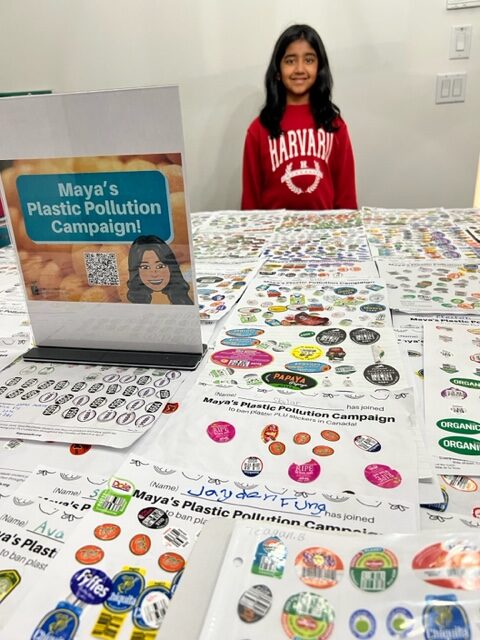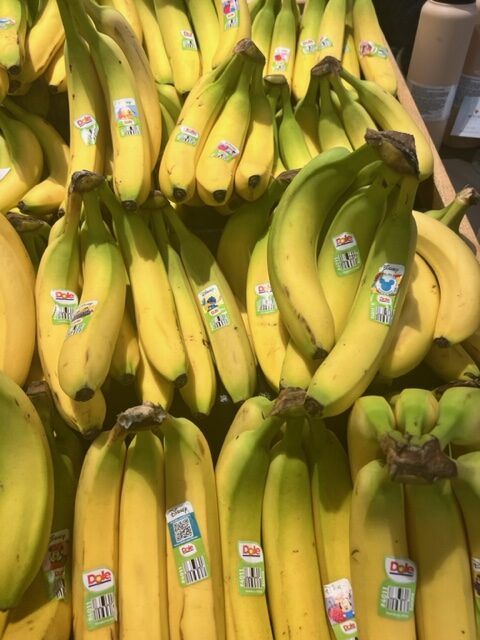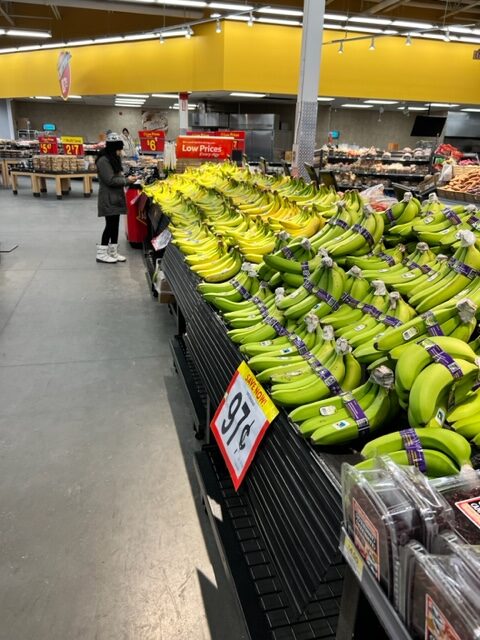Most people are aware of microplastics and the attempt to ban single-use plastic items (checkout bags, straws, stir sticks, cutlery, six-pack rings, and take-out containers) that continue to become increasingly more problematic. But very few of us have taken notice of those pesky little stickers that are slapped on most loose supermarket veggies and fruits. Shoppers see them but don’t realize that they, too, when multiplied by the thousands, create environmental pollution both in their manufacturing and disposal. Yet, through the lens of a young schoolgirl, that vision is very real.
 Helping to create uncontaminated finished compost, Maya Thiru began a mission to eliminate those oval grocery stickers. By also engaging fellow students at her Black Walnut Public School’s Eco Club in Markham as well as at Toronto’s Sathya Sai School, this campaign is rapidly gaining the attention of grassroots environmental groups and Canadian media outlets.
Helping to create uncontaminated finished compost, Maya Thiru began a mission to eliminate those oval grocery stickers. By also engaging fellow students at her Black Walnut Public School’s Eco Club in Markham as well as at Toronto’s Sathya Sai School, this campaign is rapidly gaining the attention of grassroots environmental groups and Canadian media outlets.
Black Walnut’s teacher Jennifer Harcharik explains, “We have about 60 students in our Eco Club. The whole school (of roughly 800) was encouraged to participate in the campaign.”
These vinyl-coated plastic stickers are known as Price Look-Up (PLU) codes. Although used for inventory and more efficient cashier code scanning, when discarded with the peelings and sent to municipal compost facilities or washed down the drain, they contaminate finished compost and add plastic to our waterways.
 Susan Antler, the Executive Director of the Compost Council of Canada, stated, “The stickers are extremely thin and pliable, so they can pass through screens designed to catch them and other non-compostable items. Upon entering municipal composting or anaerobic digestion facilities, eliminating them is both time-consuming and expensive. When a load of organic material from green bins and other sources contains many plastic PLUs, as well as other non-compostable items, it can get sent to a landfill site instead of the composting facility. In a landfill, the organic matter will break down, creating methane, a greenhouse gas, that contributes to climate damage.”
Susan Antler, the Executive Director of the Compost Council of Canada, stated, “The stickers are extremely thin and pliable, so they can pass through screens designed to catch them and other non-compostable items. Upon entering municipal composting or anaerobic digestion facilities, eliminating them is both time-consuming and expensive. When a load of organic material from green bins and other sources contains many plastic PLUs, as well as other non-compostable items, it can get sent to a landfill site instead of the composting facility. In a landfill, the organic matter will break down, creating methane, a greenhouse gas, that contributes to climate damage.”
If washed down the drain, PLUs often pass through a wastewater plant’s screens and end up in rivers and lakes where fish and wildlife can mistake them for food.
Maya’s awareness efforts are to find a more sustainable way to identify food produce. She even created a video that stated, “During the month of March 2023, we encouraged everyone to collect their PLU stickers onto our sticker sheet and at the end of April give them to parliament.” Anti-plastic campaigner Maya is taking further steps towards adding the PLU stickers to the proposed six single-use plastic ban. What’s more, on October 2/23, in Ottawa, Maya launched a new campaign encouraging the school community to join her in eliminating single-use plastics for school lunches. Her meticulous study comparing the costs for and against the use of single-use plastic revealed that families could save over $527 million during the school year by rejecting 4,656 pieces of disposable plastic and opting for reusable containers.
 “I was shocked at how much my mom and dad can save by moving to reusable containers,” says Maya, “and I’m very worried that we’re making so much plastic pollution just through our school lunches. I’m hoping kids and their teachers all over Canada will join my campaign to help stop plastic pollution and save their families a lot of money. Plastic pollution harms all of us, our plants, our soil, our animals, our planet, and even ourselves. Let’s reduce single-use plastics in our school lunches and help our family’s budget and our planet.”
“I was shocked at how much my mom and dad can save by moving to reusable containers,” says Maya, “and I’m very worried that we’re making so much plastic pollution just through our school lunches. I’m hoping kids and their teachers all over Canada will join my campaign to help stop plastic pollution and save their families a lot of money. Plastic pollution harms all of us, our plants, our soil, our animals, our planet, and even ourselves. Let’s reduce single-use plastics in our school lunches and help our family’s budget and our planet.”
“It’s amazing what one 11-year-old can do to tackle the plastic problem that pollutes every part of our environment and adds to our climate chaos,” says Beatrice Olivastri, CEO of Friends of the Earth Canada. “We are proud to be working with Maya and all students that want to work with her. After all, Maya and kids like her the world over are going to inherit the massive amounts of plastic waste we are leaving behind. Maya is part of the upcoming generation of environmental activists dedicated to protecting people and the planet. All of us here are inspired and excited to be working with such a bright and dynamic young woman.” Olivastri added that any class, school, or individual can join in by downloading the campaign material from Friends of the Earth’s Plastic-Free Lunch Campaign website.
Youth environmental awareness can be generated through posters, creative junk art, public speaking, sharing project ideas, comedy skits, announcements on the school’s PA system, creating partnerships with local businesses, essays and poetry.
Maya wrote the following poem about Plastic PLU stickers.
These stickers may be useful,
But saying they are good is very untruthful.
They are made out of plastic,
So they are not so fantastic.
They start off covering your food,
At the bottom it is thinly glued.
In the end they enter our compost,
Greenhouse Gasses are now its permanent host.
As they flood our rivers,
The thought just makes me shiver.
Many animals have lost their lives,
Although the plastic has decreased in size.
Besides adopting the PLU sticker campaign, Black Walnut’s Eco Club’s role is to be ambassadors for the school. Students engage in community clean-ups, tend their garden, and have set up a recycling centre at the front of the school (for milk bags, batteries, pop tabs, and marker lids). As well, children enjoy weaving milk bags to make mats to sit on. Helping to get word out about various initiatives even reaches the kindergarten tots; although not actively involved, they too learn about the Eco Club’s activities to share various initiatives with their families.
Supporting “Environmental Leadership and Climate Action,” Toronto’s Sathya Sai School has achieved the “EcoSchools Canada 2023 Gold Certification.”
Through their environmental achievements, whether they are composting programs, gardening, protecting our waterways, or recycling and reducing plastic use, youth are proud and excited about their empowerment to become part of the solution for a brighter future.
Related Links
https://foecanada.org/wp-content/uploads/2023/10/Mayas-Lunch-Study-8.5-x-11-in.pdf
https://foecanada.org/water-and-plastics/plastic-free-lunch-campaign/
https://www.cbc.ca/kidsnews/post/why-this-10-year-old-is-raising-awareness-about-plastic-produce-stickers
https://foecanada.org/tag/maya-thiru/ https://foecanada.org/tag/plastic-pollution/
ABOUT THE AUTHOR
Larraine Roulston
Larraine writes children’s illustrated adventure books on composting and pollinating. To view, visit: castlecompost.com.
This article is featured in Canadian Teacher Magazine’s Winter 2024 issue.









